Allahumma Anta Rabbi La Ilaha Illa Anta Meaning and Arabic Text (Full Dua)
Allahumma anta rabbi la ilaha illa anta dua, commonly known as Sayyidul Istighfaar is the best supplication and the most superior way to seek forgiveness from Allah.
Advertisements
Let’s learn this beautiful and great Dua…
Allahumma Anta Rabbi La Ilaha Illa Anta Meaning in English
The meaning and translation of the allahumma anta rabbi dua is O Allah! You are my Rubb. There is no true god except You. You have created me, and I am Your slave, and I hold to Your Covenant as far as I can. I seek refuge in You from the evil of what I have done. I acknowledge the favours that You have bestowed upon me, and I confess my sins. Pardon me, for none but You has the power to pardon.
Allahumma Anta Rabbi In Arabic
Here is the Allahumma Anta Rabbi Dua in Arabic Text.
اللّٰهُمَّ أَنْتَ رَبِّي، لَا إِلٰهَ إِلَّا أَنْتَ، خَلَقْتَنِيْ وَأَنَا عَبْدُكَ، وَأَنَا عَلَى عَهْدِكَ وَوَعْدِكَ مَا اسْتَطَعْتُ، أَعُوْذُ بِكَ مِنْ شَرِّ مَا صَنَعْتُ، أَبُوءُ لَكَ بِنِعْمَتِكَ عَلَىَّ وَأَبُوءُ لَكَ بِذَنْبِيْ، فَاغْفِرْ لِيْ، فَإِنَّهُ لَا يَغْفِرُ الذُّنُوْبَ إِلَّاأَنْتَ۔
Advertisements
Allahumma Anta Rabbi Transliteration
Here is the transliteration to help with pronunciation of the dua,
Allahumma anta rabbi la ilaha illa anta, khalaqtani wa ana abduk, wa ana ala ahdika wawa dika mas-tata‘t, a‘oothu bika min sharri ma sana‘t, aboo-o laka bini‘matika ‘alay, wa-aboo-o bithanbee, faghfir lee fa innahu la yaghfiru-thunaba illa ant.

Allahumma Anta Rabbi Hadith
The hadith of Allahumma anta rabbi is found in Sahih Bukhari. Below is the hadith
Narrated Shaddad bin Aus:
The Prophet (SAW) said “The most superior way of asking for forgiveness from Allah is: ‘Allahumma anta Rabbi la ilaha illa anta, Khalaqtani wa ana Abduka, wa ana ala ahdika wa wa
dika mastatatu, A`udhu bika min Sharri ma sana tu, abu’u Laka bini matika alaiya, wa abu’u laka bidhanbi faghfir lee fa innahu la yaghfiru adhdhunuba illa anta.”
The Prophet (SAW) added.
Advertisements
If somebody recites it during the day with firm faith in it, and dies on the same day before the evening, he will be from the people of Paradise; and if somebody recites it at night with firm faith in it, and dies before the morning, he will be from the people of Paradise.
Whoever supplicates with these expressions during the day with firm belief in the supplication and dies on the same day (before the evening) will be among the dwellers of Paradise.
Similarly, the one who supplicates with these expressions in the evening with firm belief in it and dies before the morning will be among the dwellers of Paradise.
Advertisements
The Prophet SAW said the best supplication for seeking forgiveness is to say:
‘O Allah, You are my Lord; there is none worthy of worshipexcept You. You created me and I am your servant.’
You acknowledge to Allah with your tongue and heart that He is your Lord, your King, the Controller of your affairs and the Knower of your situation.
You are His servant in His Universal and Legislative acts. As for your servitude to His Universal acts, He does whatever He wishes with you.
If He wills, He causes you to fall sick or grants you good health. If He wills, He grants you wealth or makes you poor. If He wills, He guides you or leads you astray based on His Wisdom.
Similarly, you are the servant of His by Legislative acts. You have to worship Him the way He has commanded you. You should carry out His obligations and stay away from His prohibitions.
Confess to Him that: “O Allah, You are my Lord. There is no god beside You. You created me and I am Your slave, following Your covenant and Your promise as much as I can.’
You should acknowledge that Allah is the One who created you when He brought you out of nothing.
You should follow His covenant and promise to the best of your ability. This is because everyone took covenant from Allah to do what he has been taught:
“When Allah took covenant from those who were given the scriptures to make it known and clear to mankind and not to hide it.”
SIurah Al Imran: 187
Whenever Allah blesses you with knowledge, it is indeed a covenant you have taken from Him that you will apply it.
“I follow your promise” means I believe in your promise. That is, the good you have promised the good-doers and the evil you have promised the evildoers.
But I follow Your promise, that is in goodness. Indeed, you are seeking nearness to Allah – the Mighty and Sublime- with these words.
“I seek refuge in you from the evil I have done.” That is, you are seeking refuge with Allah from the evil you have committed because a person is rewarded for his good deeds and punished for his evil deeds.
The evil he did may be a cause of going astray as stated by Allah – the Mighty and Sublime:
“And if they turn away, then know that Allah is will to punish them for some sins of theirs!’
Surah 5: verse 49
Therefore, you should seek refuge with Allah from the evil of what you have done.
Then, “I acknowledge before You Your blessings bestowed on me.” That is, I admit and acknowledge your great favours which are innumerable!
“I confess my sins to You,” that is, I admit them. “So forgive me this sin for surely no one can forgive sin except you.”
You should endeavour to memorize this supplication, and adhere to it in the morning and in the evening.
If you die during the day you will be among the dwellers of Paradise; and if you die during the night you will be among the dwellers of Paradise.
Related articles:
- Allahumma Innaka Afuwwun Tuhibbul Afwa ,
- Allahumma a Inni Ala Zikrika Wa Shukrika ,
- Allahumma Inni As Alukal Huda.
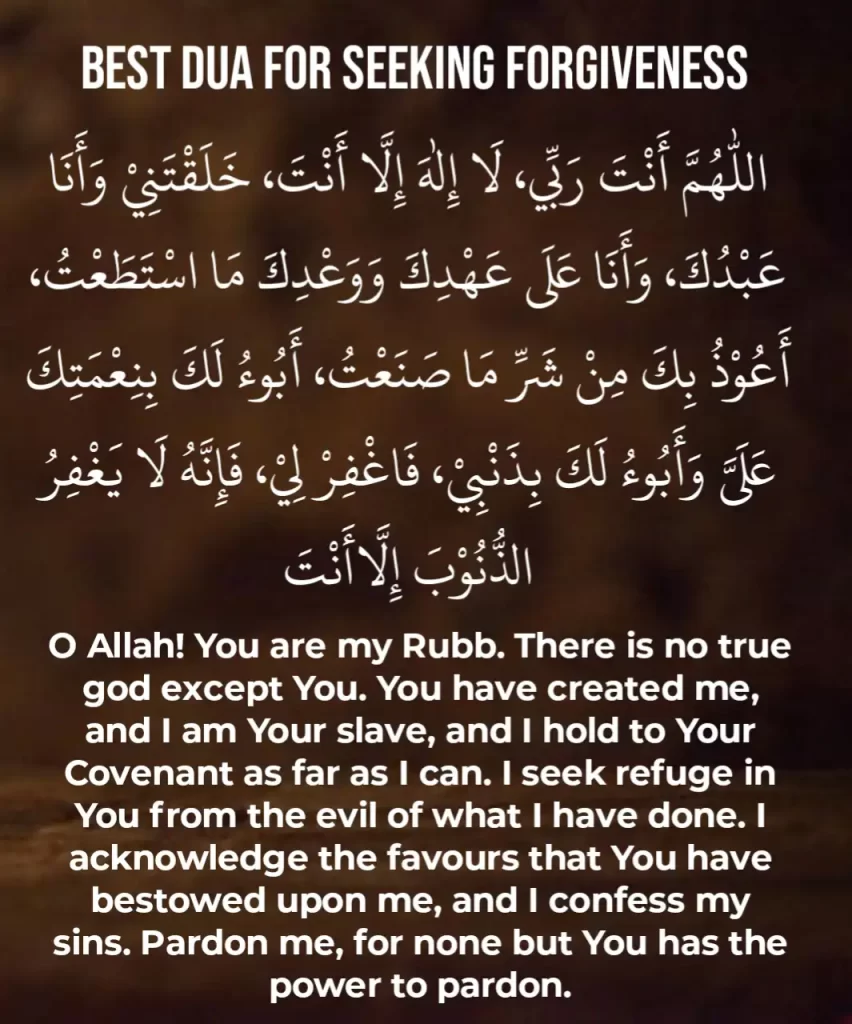
Commentary
The Prophet (SallaAllahu alayhi wasallam) called this supplication “the master of seeking forgiveness,” and he added that whoever says it with certainty in the morning or evening and dies during that morning or evening will enter Paradise.
We begin the supplication by acknowledging Allah as our Lord, which means we acknowledge His authority over us as well as His bounties and blessings.
As Allah is our Lord, we must interact with Him appropriately; so, we worship Him alone and affirm this in our supplication by saying that there is none worthy of worship but Him.
To emphasise Allah’s Lordship over us, we remind ourselves that He created us, thus we are His slaves and must worship Him as He commands.
After acknowledging Allah’s dominance and superiority over us, we go to how we are to interact with Him, which is to endeavour to fulfil our pledge to Him.
Our pledge to Allah is the vow we made when we were taken from Adam’s back (alayhi assalam).
Allah says in the Qur’an;
And [mention] when your Lord took from the children of Adam, from their loins, their descendants and made them testify of themselves, [saying to them], “Am I not your Lord?” They said, “Yes, we have testified.” [This] lest you should say on the Day of Resurrection, “Indeed, we were of this unaware.”
Qur’an, Surah Al-A’raf [7:172]
Allah’s covenant with us is the one mentioned in the hadith reported by Muadh ibn Jabal, in which Allah promises not to punish anybody who does not associate with Him.
By emphasising that we will keep our vow for as long as we are able, we accept our shortcomings and weakness towards Allah, since we will never be able to worship and thank Him as He truly deserves.
We seek refuge in Allah from the evil of our activities, which may lead to punishment or further misguidance, and hinder us from doing more good.
We feel greater shame to disobey Allah when we realise His blessings over us, thus we confess our sins as a manner of asking for repentance in that we acknowledge our mistakes and wish to correct them.
All of what has been mentioned thus far in this dua is only a warm-up for the final part, which is to ask Allah for forgiveness.
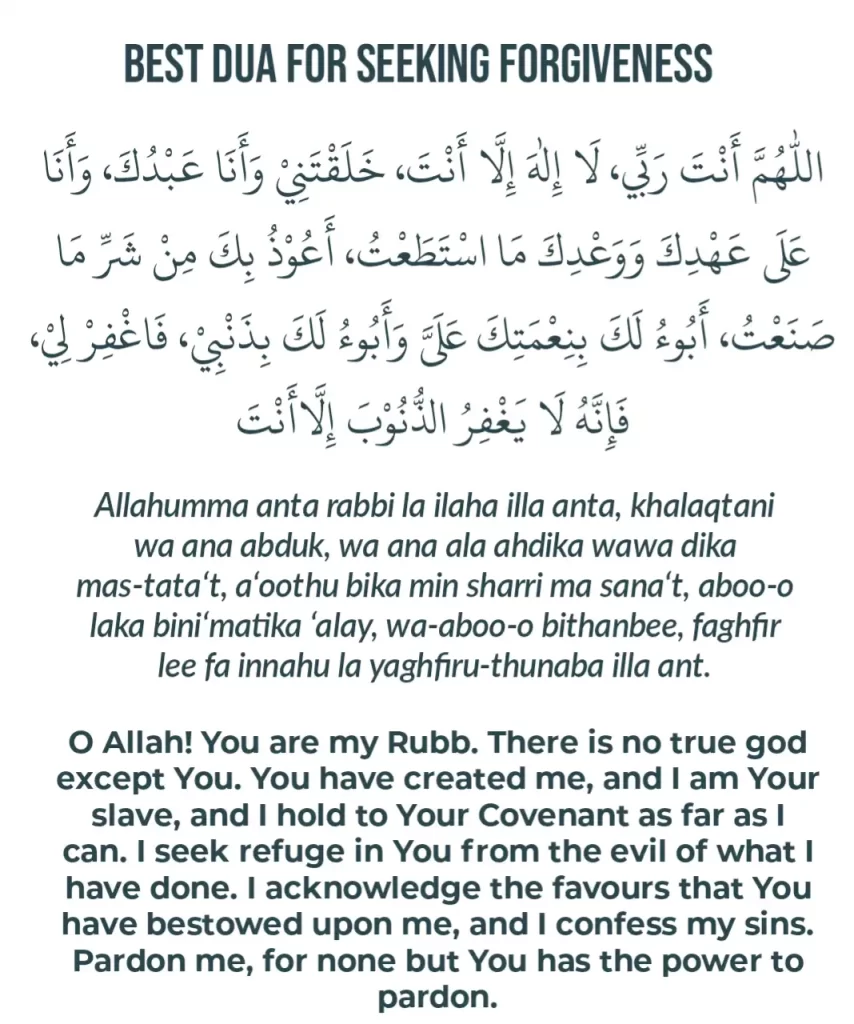
Action points
Though the purpose of this supplication is to ask Allah for forgiveness, we only do so at the conclusion, thus we learn that the best approach to seek forgiveness is not to ask for it right away, but to mentally prepare yourself by humbling yourself before Allah and strengthening your desire to be forgiven.
This dua teaches us how to repent, which is to admit our mistakes, intend never to repeat them, and ask Allah to forgive them.
This hadith teaches us the ideal manner to ask forgiveness, which should include the following:
- Acknowledging Allah’s majesty and the fact that He deserves to be worshipped.
- Acknowledging our vow to Allah, which is to take Him as our Lord.
- We are hoping for Allah’s promise to allow us to enter Paradise if we do not associate partners with Him.
- Seeking Allah’s refuge from the evil of our sins.
- Acknowledging Allah’s blessings on us
- Acknowledging our weaknesses towards Allah in terms of sins and failing to perfect acts of worship.
- Verbally asking forgiveness when we have humbled ourselves before Allah and recognised our enormous need for Him as well as our failings in regards to His rights.
It is not surprising that the prophet (SallaAllahu alayhi wasallam) said that whoever says it with certainty will enter Paradise, because whoever says it with certainty is someone who sincerely repents to Allah, and Allah will accept the sincere person’s repentance and forgive his sins, so this person will enter Paradise.
Advertisements

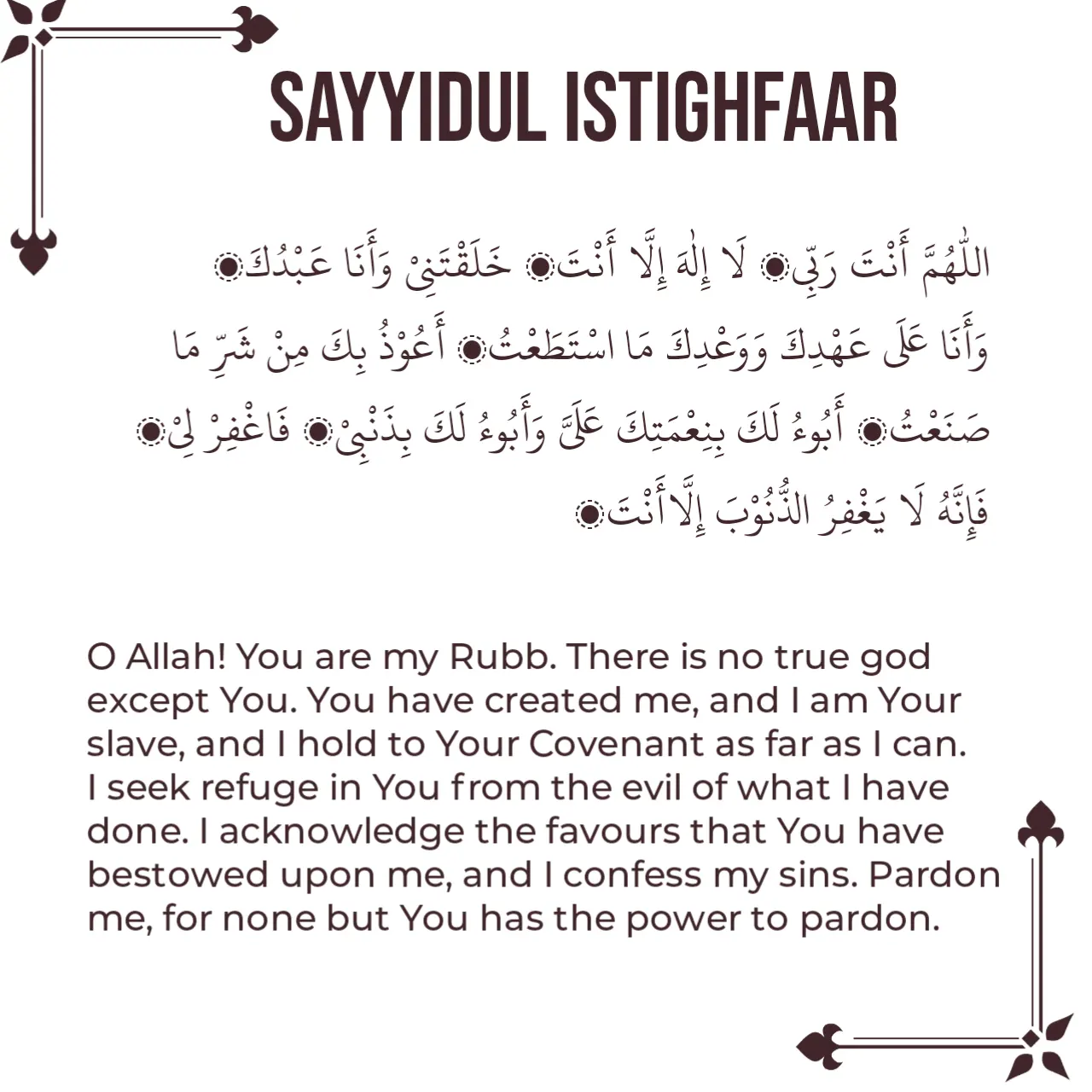

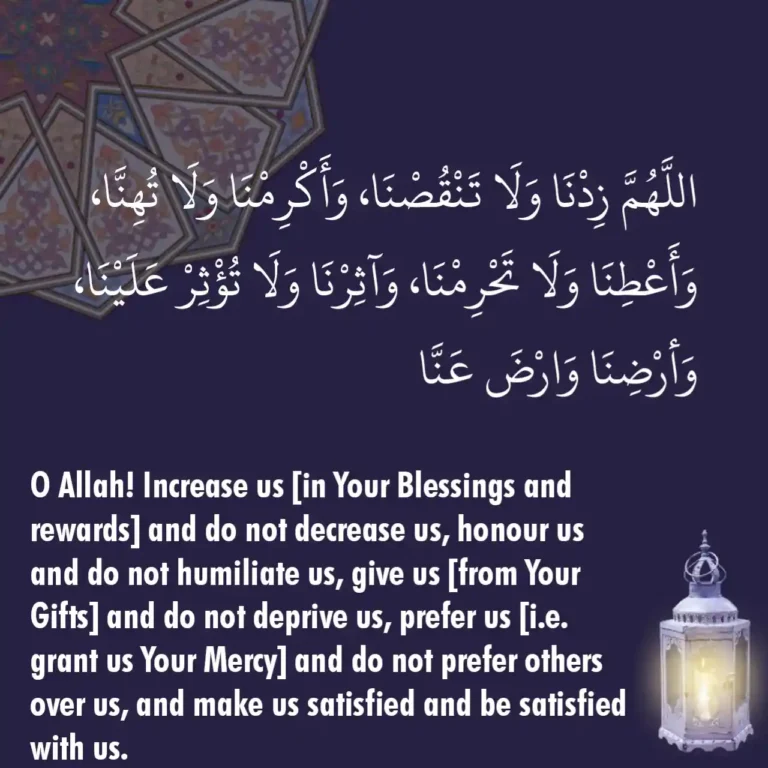
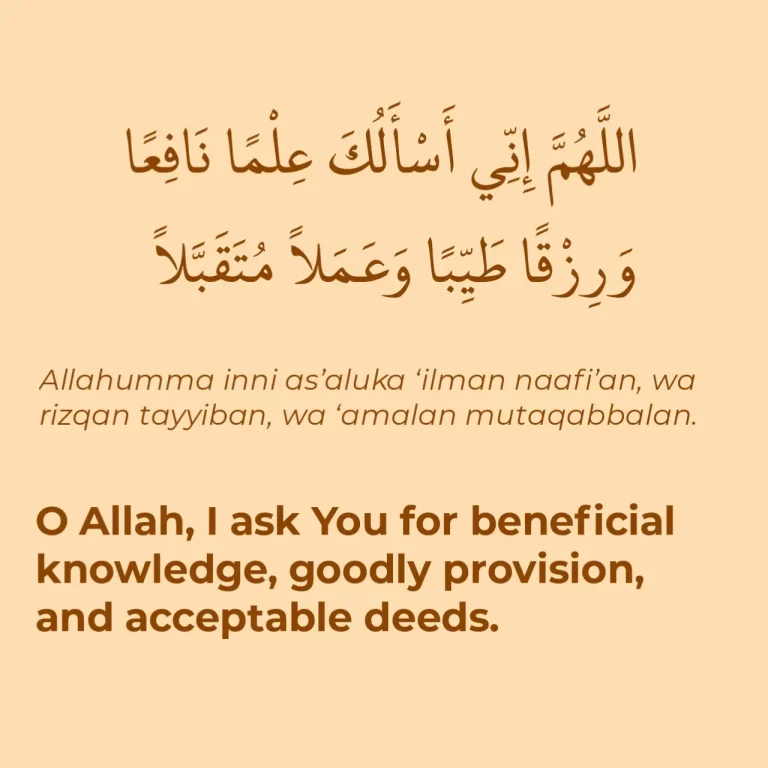
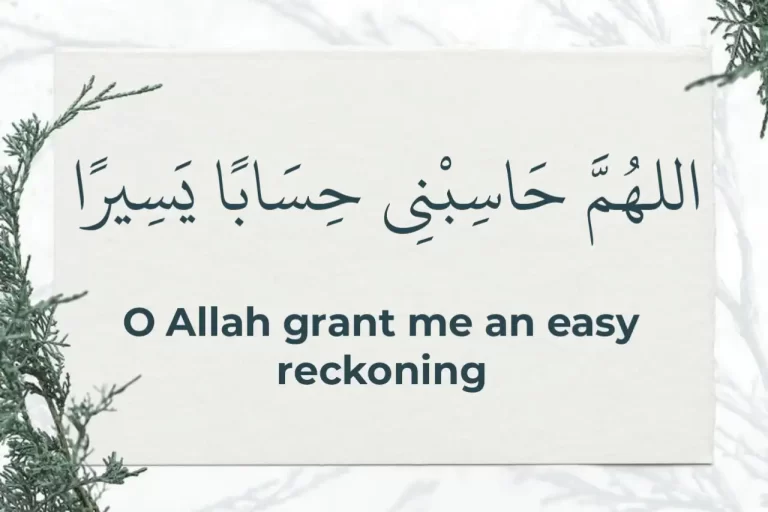
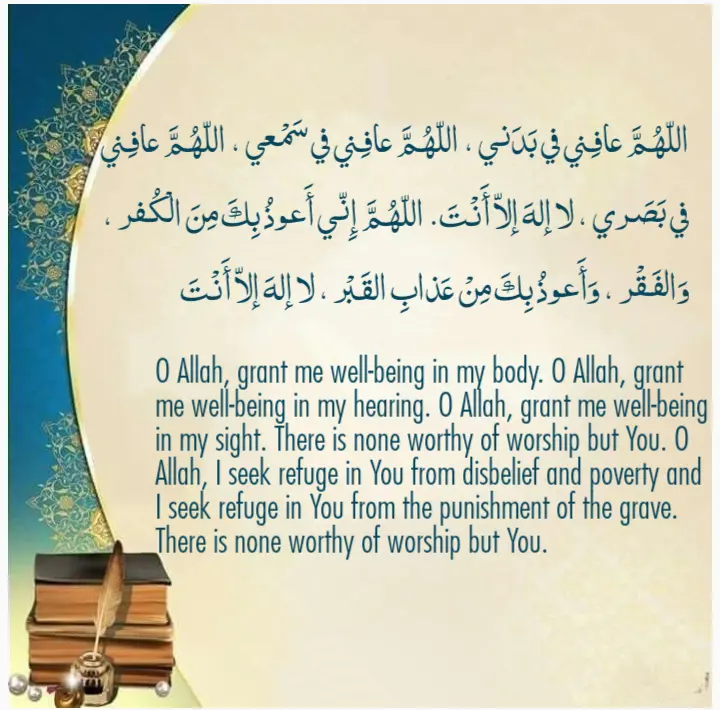
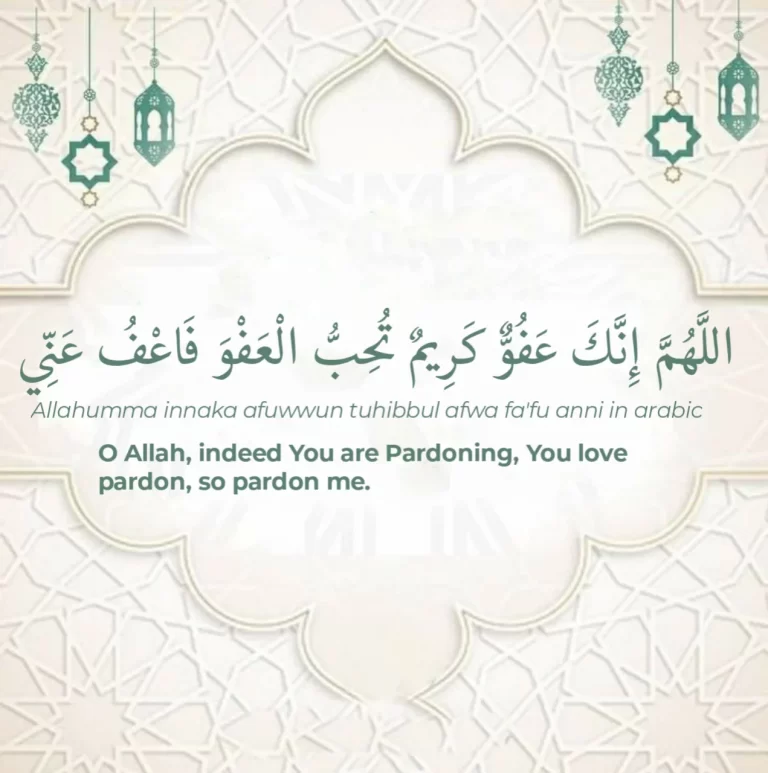
8 Comments